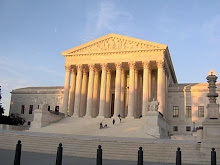As I stated in my first post, I worry about the emergence of blogging as a form of journalism because of the lack of accountability and the tendency of bloggers to lean heavily toward one side of an issue or the other. The three articles we read in Power Journalism this week attempt to address those issues.
Patrick Beeson’s article “Blogging: What is it? And how has it affected the media?” appeared in Quill Magazine in March 2005. Beeson argues that journalists need not compete with bloggers but work in tandem with them as a way of gathering information and as a way of adding to what they are already publishing.
Beeson describes blogs used as “citizen journalism” in times of crisis, such as the days following the 2005 Tsunami in South Asia. There are absolutely times in which blogs are incredibly useful. The ability to link to or quote from blogs adds a real human element to stories about disasters. After the tsunami, the blogs and videos that came out of the disaster zone made readers/viewers feel like they were really there. It made it that much easier to understand the true emotional impact of the events. The same can be said for the cell phone videos of the London train bombings in 2005.
I do agree that blogs are a useful tool in adding to the conversation about news events, and I think that the type of person who reads a blog on a newspaper Web site will ask different types of questions and add things to the discussion that a person who simply reads articles will not.
As I mentioned in my first post, I think media outlets can use blogs to explain aspects of their reporting or write about things that would be inappropriate for a regular story but add to the conversation. I also enjoy blogs about the media. I still worry that there are people who read “biased” blogs and take everything they read as fact without questioning whether the information is balanced or even accurate. Two other articles, “What Journalists Can Learn From Bloggers” and “What Bloggers Can Learn From Journalists,” by Steve Outing, both published on pointer.org, address some of these issues....
Outing also says journalists can learn to use blogs to enhance the conversation about news. He argues that investigations could be more in-depth and be over more quickly if journalists use blogs to start a dialogue and dig up new sources. While I think this is an interesting point, his example — the Watergate investigation — is the same example I would use to argue that blogging can hurt investigative journalism. While I understand Outing’s point, I worry that there are some cases in which you do not want your sources to know you’re investigating them, and putting it out there on the Internet (or bloggers uncovering information first) can jeopardize an important investigation.
Outing also says journalists can learn from bloggers to not be so afraid of having their opinions known. He discusses Ana Marie Cox’s (otherwise known as Wonkette) argument that as long as bloggers are transparent and admit their biases and that their information may be inaccurate, they can publish whatever they like. While I don’t like the idea of it being “OK” to publish inaccurate information, I do share the belief that transparency is better than attempting to maintain an illusion of “objectivity.”
As far as what bloggers can learn from journalists, Outing says that an editing process would be a big help to blogs. An editor help keep embarrassing grammatical mistakes out of a blog, but would also be able to prevent libelous statements from making it into “publication.” This is the most important thing in Outing’s article, in my opinion. I could not agree more with his assessment that it is hard to believe no bloggers have been sued for libel. He also discusses the idea of a blogging code of ethics and the need for bloggers to have an understanding of media ethics and law.
Outing ends his article by discussing the fact that journalists, as members of “the fourth estate” have tremendous power that bloggers are now in a position to share. As should be evident by the title of my blog, I believe strongly in the concept of the media as a government watchdog. This is perhaps why the idea of anyone with an Internet connection being able to become a “journalist” makes me nervous. It is a responsibility that should not be taken lightly.


No comments:
Post a Comment